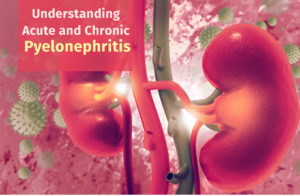
Pyelonephritis, also known as urothelial pyelonephritis, is a kidney disease caused by bacteria. The most common cause for kidney infections in children is often from a urinary tract infection (Urinary tract infection, UTI). When the bacteria enter the bloodstream of the damage causes kidney failure. It is more common among children than adults.
Pyelonephritic disease can cause permanent damage to your kidneys and when the kidneys are damaged they cannot function properly, which is the main cause for this type of kidney disease. Kidney failure can result from inflammation of the blood vessels or from damage to the kidneys themselves. Pyelonephritic disease can lead to shock, renal failure and death.
In children pyelonephritic disease is usually diagnosed during its early stages. It can be identified through urine tests that detect an infection with pyuria. Urinary tract infections are caused by bacteria that attach to the urinary bladder lining, causing infection in the urethra and kidneys, resulting in a thickening of the bladder lining and in some cases in inflammation. An elevated calcium level in the urine indicates an infection, so an ultrasound may be used to determine the presence of a urinary tract infection.
Other ways that pyelonephritic disease can be diagnosed in children include urinalysis tests, and sometimes CT scans of the abdomen and pelvic region. During a urinalysis test, the urine is examined for bacteria, pH level and uric acid content. An ultrasound can also be used to detect pyelonephrene in the urine. Sometimes a high calcium level in the urine can also indicate a UTI and therefore an ultrasound may be used to confirm the diagnosis.
In most cases of pyelonephritis there will be no symptoms of kidney failure
When pyelonephritis causes kidney failure it is usually because of damage to the kidney itself. Symptoms of kidney failure include nausea, vomiting, fever, fatigue, jaundice, fluid in the urine, severe pain in the abdomen and sometimes a fever.
If you suspect your child has pyelonephrene urinalysis test can be done to confirm the diagnosis. A small sample of the urine can be collected under a general anesthetic. Then a dye is injected into the urine. This dye will show if there is an infection in the bladder, and if there is, the color changes depending on the color of the urine. If a fever develops and if pain is present the dye can be used to confirm the diagnosis of pyelonephritic kidney disease.
If your child has this disease, it is important that you seek immediate medical attention. Early diagnosis is essential for proper treatment. A doctor may prescribe antibiotics to prevent further infection and kidney failure.
There are many common treatments for this type of kidney disease. Some of these treatments include: steroids, surgery, dialysis and hydrotherapy. Some of these treatments can lead to complications of kidney failure.
There are some children that are more likely to develop kidney disease in their later years. Children with cystic fibrosis are more likely to develop this condition. Other conditions such as obesity and genetic disorders may also lead to this condition. If you notice that your child is gaining weight or they seem to have more frequent urination than normal then it may be an indication of this problem.
There are treatment options for pyelonephritis available
You may want to consult with your child's physician and see if there is a way to help them avoid developing this problem. Medications can be prescribed for the treatment of kidney failure and the inflammation in the kidneys.
In order to avoid further complications treatment it is important that your child is monitored by a doctor on a regular basis. Your doctor will also check for kidney failure, especially in older children.
Aspirin and other NSAID medications are among the more common forms of treatment for this form of kidney disease. These medications can help to reduce inflammation, but have serious side effects that can cause damage to the kidneys over time. Natural remedies can be used for both prevention and treatment.